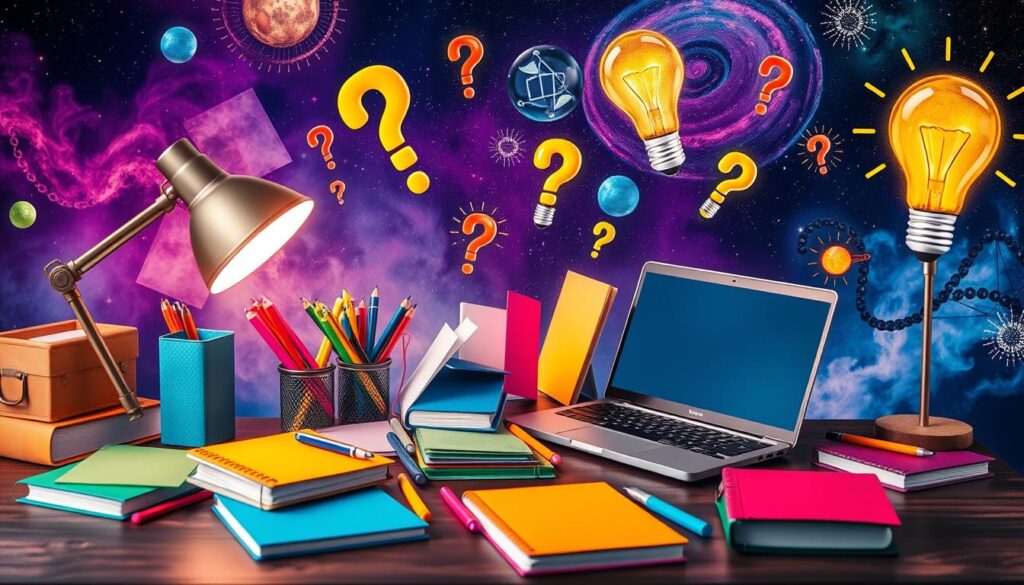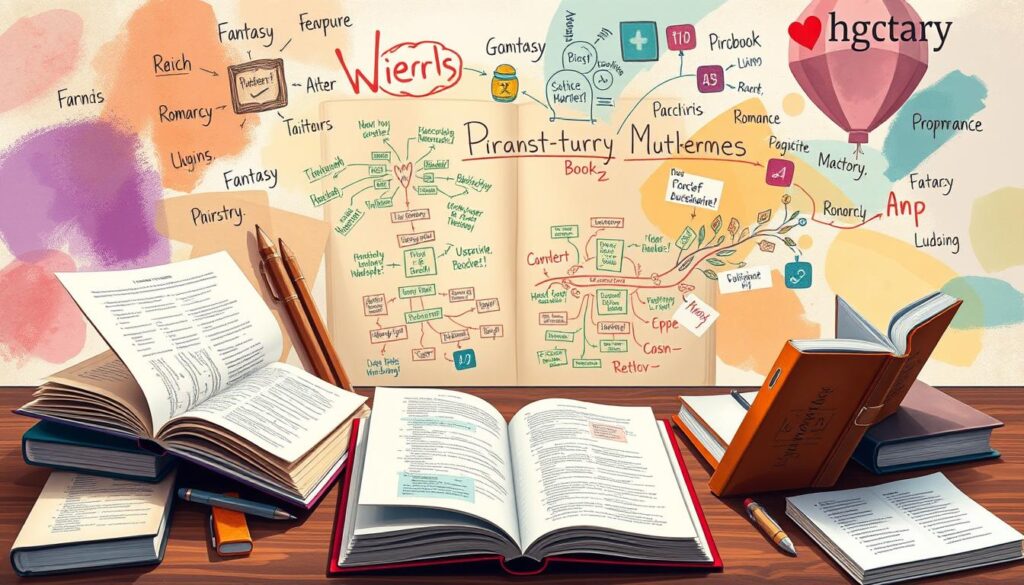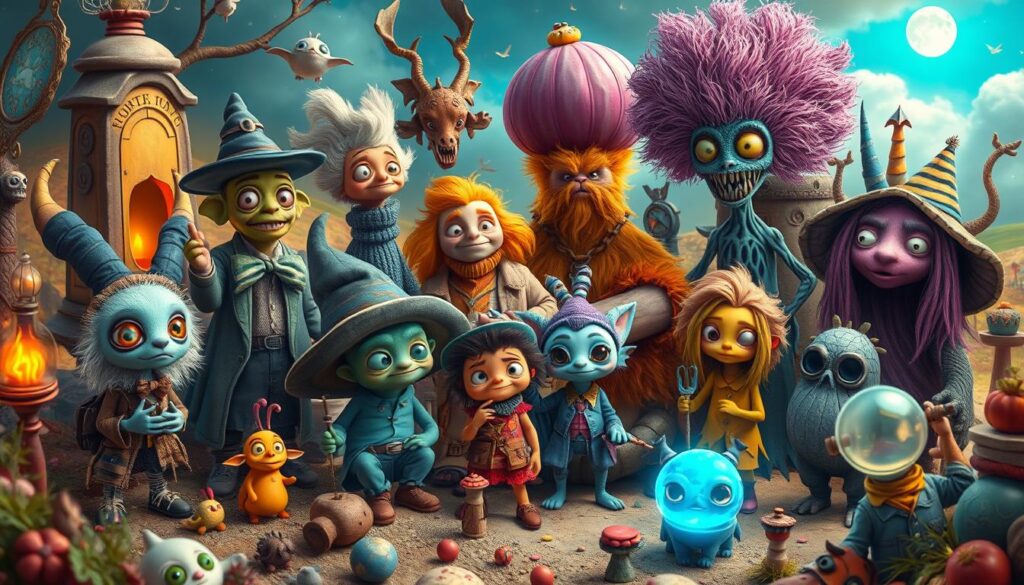“The best way to predict the future is to create it.” – Peter Drucker. This powerful sentiment resonates deeply for any aspiring writer navigating the vast landscape of book creation.
Writing a book can often feel like an insurmountable task. It’s filled with challenges like plot development, character creation, and writer’s block. However, with innovative tools like ChatGPT, authors can turn to thoughtful prompts designed to ease these burdens and unlock creative potential. By harnessing the capabilities of AI, writers can generate exciting ideas, structure their narratives, and breathe life into their characters.
Research indicates that there are 9 cases where ChatGPT can assist in writing a book. It can help with generating outlines, developing characters, and even crafting engaging dialogues1. Additionally, 20 Creative ChatGPT Prompts tailored for writing encompass various steps. This ensures writers can effectively navigate their book creation journey2. With ChatGPT, the future of writing is not just something to predict; it’s a canvas waiting to be crafted.
Key Takeaways
- ChatGPT prompts can assist in overcoming writer’s block and developing compelling plots.
- Utilizing AI writing prompts can streamline the book-writing process significantly.
- Effective prompts allow writers to create intricate characters and immersive settings.
- Structured outlines can be easily generated using ChatGPT, serving as roadmaps for authors.
- Feedback and improvement can be enhanced through ChatGPT’s innovative capabilities.
The Importance of Prompts in Writing
Prompts are key for writers, offering guidance that boosts creativity and idea growth. ChatGPT, with 180.5 million users, is a crucial tool for authors. It helps them explore new ideas and polish their stories. Every week, 100 million people use ChatGPT, showing its value for creating chatgpt book prompts and chatgpt author prompts3.
Writers find great help in the many prompts available. These focus on generating ideas, developing characters, and improving dialogue4. This support keeps authors on track, helping them meet big writing goals like finishing a 90,000-word book in six months3. Custom prompts make writing more personal, fitting the writer’s style and themes, and deepening their connection to the story4.
Writers also get better by adding context, like chapter outlines, to make their stories more coherent and deep5. As AI grows, so does how writers use prompts to improve their stories. Using chatgpt author prompts well can make stories more engaging and rich, highlighting AI’s role in today’s writing.
What Prompts to Give ChatGPT to Write a Book?

ChatGPT can change how authors write. It’s a powerful tool for coming up with book ideas and improving stories. By knowing how to use it, writers can make the most of it. Tailored prompts help boost creativity and make writing easier.
Understanding the Role of ChatGPT in Your Writing Process
ChatGPT is a smart tool made by OpenAI. It can understand and answer human questions. It helps authors by coming up with new ideas and inspiration6.
There are many prompts available. They help with ideas, solidifying concepts, and creating characters7. This lets authors dive deeper into their stories. They also get quick feedback on their writing6.
Benefits of Using AI Prompts for Authors
AI prompts bring many benefits to writers. They make writing smoother and more fun. They help solve problems like writer’s block6.
These prompts offer a clear way to write. They let authors focus on telling stories. At the same time, they make editing easier6.
There are prompts for different parts of writing. They keep the creative flow going. This makes the stories better and more engaging7.
Overcoming Writer’s Block with ChatGPT
Writer’s block can really hold back many authors. It stops creativity and slows down progress. ChatGPT offers a great way out with its special prompts. These prompts spark new ideas and fresh views.
By talking to ChatGPT, writers can find many angles to explore. This turns a tough writing time into a fun journey of possibilities.
ChatGPT can also suggest themes and ways to write that writers might not think of. As writers chat with ChatGPT, they get prompts that push them to think differently. This helps break through writer’s block and keeps the writing exciting.
Using ChatGPT regularly keeps the ideas flowing. Writers can get fast feedback on their work, find what needs work, and even shape their stories better. ChatGPT’s help is key to keeping the writing moving and avoiding getting stuck.
Generating Creative Book Ideas

Starting to think of book ideas can seem hard, but it’s easier with the right tools. Chatgpt creative writing prompts help writers share their ideas clearly. This makes the creative process smoother and more focused.
How to Frame Your Ideas for ChatGPT
To get the best from ChatGPT, framing ideas well is key. Writers should clearly state the main theme or idea they want to explore. This leads to great suggestions.
For example, asking ChatGPT for five unique plot ideas can be very helpful. It helps create stories with interesting characters and conflicts8. ChatGPT’s quick processing of data makes getting detailed answers faster and easier9.
Incorporating Themes and Genres into Your Prompts
Adding specific themes and genres to prompts is another smart move. Writers can ask ChatGPT for titles that grab attention and fit their genre and audience8. This makes sure the ideas match their vision and stay current9.
By including details like character types, settings, and emotional tones, writers can make their stories more engaging. This is thanks to chatgpt book prompts.
Developing a Book Outline with AI

Creating a detailed book outline is key to writing a story. It helps authors stay on track. Tools like ChatGPT make outlining easier by offering a structured way to plan.
A good outline keeps the story flowing smoothly. It ensures the plot and characters develop well. This is vital for a coherent story.
Key Elements of an Effective Outline
When making an outline, think about chapter structure and story pace. Also, consider how themes fit into the story. A clear outline helps authors see their book’s flow.
It makes creating engaging content easier. ai book writing prompts help guide the outline. This ensures a story with all the right parts.
Utilizing ChatGPT for Structured Planning
ChatGPT helps authors make outlines quickly. It can create outlines for romance novels in minutes. This saves time.
The AI combines information from different sources. This leads to better book writing AI systems10. But, human touch is still needed to make sure the story fits the author’s vision11.
ChatGPT lets authors create specific prompts. This makes the outline more effective. It ensures the story has all the important elements.
Writing Compelling Chapters

Captivating chapters are key to keeping readers hooked. Authors use storytelling, pacing, and tension to make chapters stand out. Chatgpt writing prompts help writers come up with new ideas and expand on stories. This ensures each chapter connects with its audience12.
ChatGPT also suggests topics and angles, helping to outline chapters. This makes the writing process smoother and more structured. It helps create a flow that keeps readers interested12.
Using prompts that spark creativity leads to better content. ChatGPT quickly generates ideas, allowing authors to explore different themes and styles. This way, they can create detailed, engaging stories that fit their chatgpt book ideas. It also helps clarify complex ideas, making sure readers understand the message13.
By combining these elements, authors can craft chapters that grab and hold readers’ attention. Using structured prompts is crucial for refining chapters. It helps writers focus on details and keep the story coherent. Exploring various chatgpt writing prompts allows authors to add unique touches to their stories, making them memorable and impactful14.
The Art of Plotline Development

Creating a captivating plotline is key for writers who want to grab readers’ attention. Good plotlines keep the story moving and add depth. Chatgpt book prompts help authors explore new ways to tell their stories.
These prompts aid in coming up with plot ideas and crafting engaging storylines. They also help manage subplots that make characters more interesting. This makes the story more immersive for readers.
Strategies for Crafting Engaging Narratives
One important strategy is to clearly define the main conflict and what drives the characters. A strong premise helps authors outline key plot points and weave in subplots. Chatgpt can offer feedback or inspiration for these developments.
Exploring different angles for each plot point can lead to surprising twists. This keeps readers hooked on the story.
Example Prompts for Developing Pivotal Plot Points
Chatgpt book prompts can really help with plot development. For example, a prompt like “What if the protagonist discovers a long-lost secret that changes everything?” can spark important plot turns. Writers might also use prompts like “Describe a scene where the antagonist challenges the protagonist to a duel, revealing their true intentions.”
By using these strategies, authors can bring fresh views to familiar themes. ChatGPT’s ability to generate unique ideas across genres is a big help. Remember, ChatGPT is meant to enhance creativity, not replace it1516.
Creating Memorable Characters

Making characters memorable is key to good storytelling. They add depth and make stories relatable. Chatgpt creative writing prompts help authors create unique personalities.
Developing characters involves backstories, traits, and motivations. Exploring what readers connect with helps writers craft authentic characters.
Techniques for Character Development
Using specific techniques can improve character creation. Writers often focus on backgrounds and traits, as shown in ChatGPT prompts17. These prompts help authors delve into 10 unique character aspects, like internal conflicts and relationships, making up 40% of character development18.
Exploring different elements makes characters richer and sets a strong story foundation.
Using ChatGPT’s Insights on Character Arcs
ChatGPT’s insights can greatly improve character arcs. Strategies include creating a unique voice through dialogue and personality. Famous protagonists like Harry Potter and Katniss Everdeen have well-defined traits and development, making them relatable19.
Asking the right questions helps writers connect with their characters. It also challenges stereotypes and adds complexity to the story.
Establishing Immersive Settings

Immersive settings are key to great storytelling. They make readers feel like they’re right in the story. Authors can use ChatGPT to create detailed settings that match their story. By giving specific prompts, authors can get everything from magical forests to bustling cities.
It’s important to think about why the setting is there. This makes the world feel real and important, not just pretty. This helps writers create settings that readers will remember and love.
When deciding what prompts to give ChatGPT to write a book, authors have many options. ChatGPT offers lots of help for writing better settings. There are 5 main tips and 5 prompts for setting descriptions20. Plus, there are 9 tips to avoid mistakes when using ChatGPT for settings20.
Using the right prompts lets authors bring their worlds to life. This makes every scene exciting and real.
Crafting Realistic Dialogue
Creating authentic dialogue is key for character growth and plot advancement. Writers face challenges in keeping each character’s voice unique while making conversations engaging. Chatgpt book prompts and chatgpt author prompts help writers explore different styles and tones. This enhances the realism of character exchanges.
Best Practices for Authentic Conversations
To craft realistic dialogue, focus on characters’ backgrounds, motivations, and relationships. Pay attention to speech nuances like slang, jargon, or regional dialects. Adding emotional undertones can also deepen conversations, making them feel more real.
Example Prompts for Dialogue Creation
Chatgpt book prompts can greatly help writers create compelling dialogue. For example, requesting five different storytelling prompts can introduce diverse characters and their interactions. Research shows 100% of writers struggle with generating interesting ideas, proving prompts’ effectiveness21.
Generative AI tools can boost productivity by almost 40%, showing technology’s power in writing22. Many writers use AI for grammar checks, brainstorming, and text generation. This improves their dialogue creation process22. Using these tools well can refine a writer’s dialogue craft, enriching their stories.
Conducting Research for Your Book
Research is key to writing believable stories. Many writers use AI tools to make their research easier. ChatGPT, known for being smart and quick, is a favorite for many. It’s like an advanced Google for research23.
It can quickly summarize information, making writing faster. But, it’s important to double-check facts and sources to keep stories accurate24.
Leveraging ChatGPT for Fact-Checking
Using ChatGPT for fact-checking requires clear questions. It can give good summaries but might not always get references right. It could even make up quotes23.
Authors should see ChatGPT as a starting point. It helps with initial ideas, but always check with trusted sources to confirm.
Identifying Credible Sources Through AI
By crafting the right questions, ChatGPT can give better answers. But, it might not always be clear or original24. Mixing AI content with personal thoughts helps authors keep control.
In today’s fast-changing world, verifying AI suggestions is crucial. This ensures the work is genuine and reliable25.
Feedback and Improvement
Getting feedback is key for writers to better their work. ChatGPT is a great tool for this, offering insights on style, coherence, and clarity. By using chatgpt writing prompts wisely, authors can get detailed feedback to improve their writing. This aligns with advice from famous authors like Stephen King, who stresses the need to write often and read a lot26.
It’s important to see feedback as a way to get better, knowing that writing is all about rewriting. This idea is shared by many in the writing world26.
Users can guide ChatGPT to give feedback that really speaks to them. By choosing the right chatgpt author prompts, it can help understand context, tone, and subtleties better27. This helps authors make their stories better and connect with their readers on a deeper level. It ensures the writing feels right, building trust26.
To get the most out of ChatGPT, writers should talk back to it to refine the feedback. They should tell ChatGPT what they’re worried about, like the plot or characters. This way, they get a full review that points out areas for growth. Using real research and examples in prompts can also make writing better, helping authors reach new heights. Writing is a never-ending journey of getting better, using technology and learning together.
Marketing Your Book with ChatGPT
In today’s world, marketing is key for authors to reach readers. ChatGPT offers big benefits for making marketing plans. It helps find the right audience and pick the best ways to promote your book. Plus, it crafts messages that grab the attention of potential readers.
Building a Marketing Strategy Using AI
Creating a winning marketing plan means looking at lots of data. Studies show 35% of marketers use AI tools every day28. This shows AI is a big deal in marketing. Also, 89% of marketers see AI as great for making content28. So, using ChatGPT makes authors fit in with today’s marketing trends.
Crafting Compelling Copy for Promotions
Writing good promotional copy needs to know what the audience wants. With ChatGPT, authors can give it prompts that lead to exciting stories. AI helps writers show their book in a new light, as 77% of marketers find AI useful for data insights28. It’s important to mix in your own ideas with AI’s help to keep your content fresh and effective.
How to Use These Prompts Effectively
To get the most out of chatgpt writing prompts, authors need to learn how to ask the right questions. Making prompts specific helps boost creativity and ensures the AI meets the author’s goals.
Specifying the output format is key for the best results. This tells ChatGPT what kind of response to give, making sure it matches what the author wants. Adding details like character traits or plot twists helps the AI create more engaging stories.
It’s also good to give ChatGPT more to work with. Since it can handle up to 4,000 words, authors can share lots of information. This leads to more personalized and creative responses from the AI29.
Getting feedback is crucial. ChatGPT can check text for mistakes and suggest improvements. By working with the tool, authors can find new ways to tell their stories.
Using images and multimedia can make stories even more interesting. For those who pay, tools like Dall-E can help create visuals that fit the story29. Writers should use all the platform’s features to craft a compelling book.
Exploring different viewpoints can deepen understanding of themes and characters30. This method can lead to unique stories that grab readers’ attention. By practicing these techniques, authors can improve their storytelling skills and make the most of AI book writing prompts.
Final Thoughts on Writing with ChatGPT
Using AI tools like ChatGPT can really boost your writing. Authors have seen great results, like finishing a business book in just seven days31. This method keeps your writing organized and clear from the start31.
Many writers worry about ChatGPT, but it can be a great help when used right32. By using specific prompts, you can get better writing and work in smaller chunks. This leads to content that’s consistent and polished31.
It’s also important to keep your writing original and personal. Even with ChatGPT’s help, you can still make your voice shine through31. Don’t be afraid to try new things and explore your creativity with AI33.
With careful planning, ChatGPT can make your writing better and help you come up with unique ideas. So, let’s see how we can use it to our advantage.
Conclusion
Exploring what prompts to give ChatGPT to write a book shows AI’s huge potential in writing. With over 100 prompts, authors can tackle writing hurdles, spark creativity, and make stories richer13435. These tools help with outlining, creating characters, and writing dialogue, making storytelling more fun and creative.
ChatGPT does more than just help with writing; it’s great for research and keeping academic work accurate1. Using AI well can open up a lot of knowledge, making writing better and saving time. It also helps with marketing, getting stories to the right people.
Using chatgpt book prompts helps writers improve and try new things. It encourages them to be open to change and see how ChatGPT can help. This way, authors can reach their creative goals with confidence and joy3435.
FAQ
What are some effective prompts to give ChatGPT to help write a book?
How do prompts enhance the writing process with ChatGPT?
What types of AI prompts can help overcome writer’s block?
How can I generate creative book ideas with ChatGPT?
Can ChatGPT assist in creating a well-structured book outline?
What techniques can I use for writing compelling chapters with ChatGPT?
How can ChatGPT help in developing memorable characters?
What role does setting play in writing, and how can ChatGPT assist?
How can I ensure the dialogue in my book sounds realistic?
Is research important for my book, and how can ChatGPT support this process?
How can I use ChatGPT for getting feedback on my writing?
What strategies can ChatGPT offer for marketing my book?
How can I maximize the benefits of using prompts with ChatGPT?
How can ChatGPT transform the writing experience for authors?
Source Links
- 9 ChatGPT Prompts To Help You Write Your Next Book
- 20 Best ChatGPT Prompts for Writing a Complete Book: A Step-by-Step Guide
- 20 Best ChatGPT Prompts for Book Writing
- 45+ Powerful ChatGPT Prompts for Book Writing [UPDATED]
- Technique for Writing Entire Books
- Unlock the Secrets of How to Write a Book with ChatGPT
- 10 Best ChatGPT Prompts for Novel and Fiction Book Writing
- Unleash Your Creativity With These ChatGPT Prompts
- 15+ Best ChatGPT Prompts for Writing
- Technique for Writing Entire Books
- From Story Idea to Outline Using ChatGPT
- How to Write Your Ebook Using ChatGPT [Prompts Included]
- How to Write a Prompt with ChatGPT for Content Writing [AI]
- 11 Useful ChatGPT Prompts for Summarizing Books | Bizway Resources
- The Art of Fiction Writing With ChatGPT
- How to Write a Book with ChatGPT (And Why You Should) – BookishNerd
- 10 ChatGPT Prompt Templates That Help With Character Creation For Writers
- Character Development Prompts And Exercises For ChatGPT
- How to Create a Memorable Protagonist (7 Expert Tips)
- Prompts For Setting Descriptions: Tips And Examples – PromptsTY
- 130 Magical Chatgpt Prompts For Story Writing
- 50+ ChatGPT Prompts for Writing to Improve Your Skills
- Researching Your Novel With ChatGPT
- How to Write a Book with ChatGPT?: A Step-by-Step Guide
- How to build a bot, to assist in writing a book?
- 7 ChatGPT Prompts To Improve Your Writing
- How to Use ChatGPT to Write a Performance Review: A Manager’s Guide
- 23 ChatGPT Prompts Marketers Should Use
- 17 Tips to Take Your ChatGPT Prompts to the Next Level
- 15+ Rules For Crafting Effective GPT Chat Prompts – #1 Linkedin Automation Tool
- How I wrote a book in one week with ChatGPT | Esther Jacobs
- My Secret Sauce of Using ChatGPT (as a Medium Writer)
- Can AI really write books?
- Best ChatGPT Prompts for Academic Writing (100+ Prompts!)
- 25 Best ChatGPT Prompts for Writing (Free Prompt Templates)







